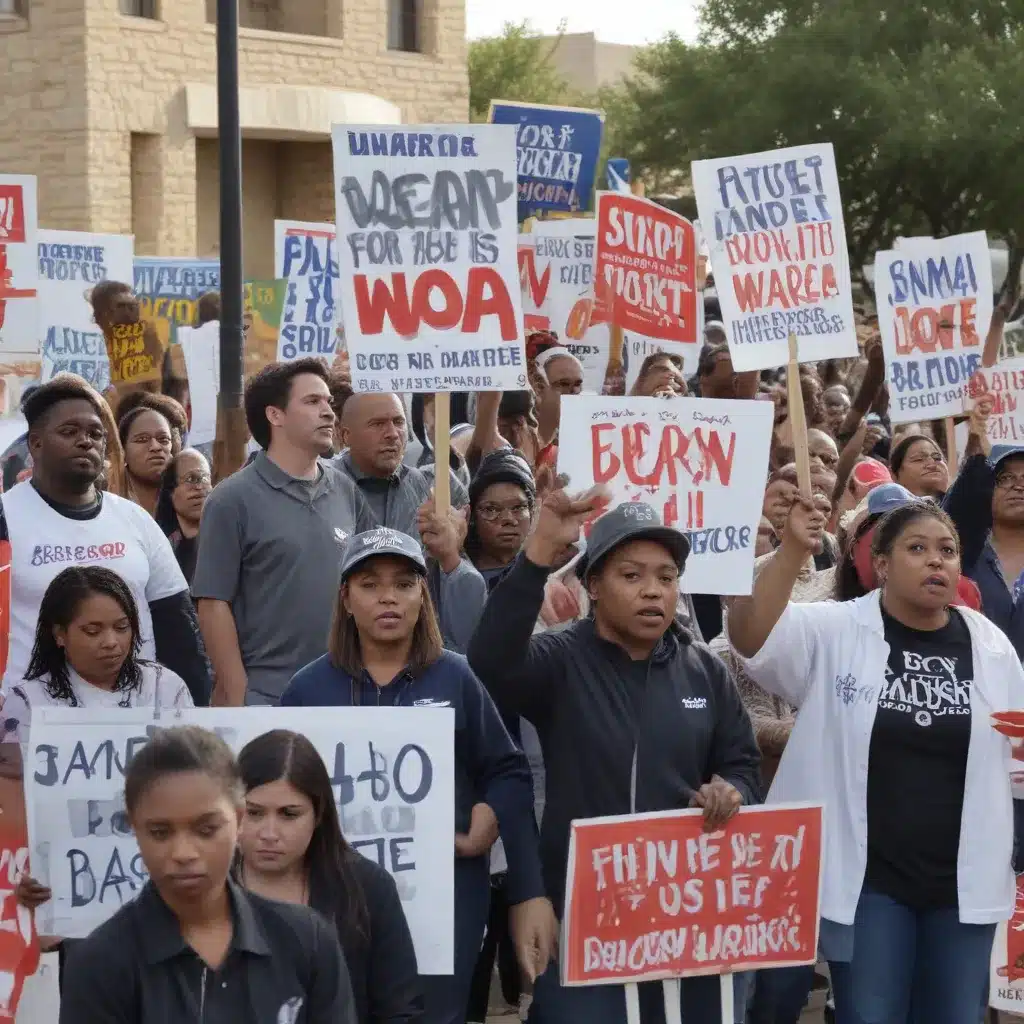
The Fight for a Living Wage in Fort Worth
In the bustling city of Fort Worth, Texas, a coalition of community organizations and labor advocates is leading the charge for a significant increase in the city’s minimum wage. Driven by the belief that no full-time worker should struggle to make ends meet, the Fort Worth for $20 Coalition is demanding that the city raise its minimum wage to $20 per hour by the fiscal year 2025.
This grassroots movement has garnered the support of several city council members, including Elizabeth Beck, Chris Nettles, and Jared Williams, who recognize the urgent need to address the issue of poverty wages among municipal employees. The current minimum wage in Fort Worth stands at $15.45 per hour, a figure that the coalition argues is simply not enough for workers to afford a basic standard of living in the area.
The Impact of Low Wages on City Employees
According to the Fort Worth Report, the coalition’s efforts are driven by the firsthand experiences of city employees who are struggling to make ends meet, even while working full-time jobs. Council member Jared Williams, who works at the Tarrant Area Food Bank, has witnessed the challenges faced by these workers, stating, “Some of those folks are city employees, and that’s not OK.”
The coalition’s call for a $20 minimum wage is based on the MIT Living Wage Calculator, which estimates that a living wage for a single person without children in the Fort Worth area is $22.78 per hour. While the city management’s proposal to increase the minimum wage to $16.07 per hour would impact 121 employees, the coalition’s plan to raise it to $20 would affect 773 workers – a significant number who would benefit from a more livable wage.
Concerns over Wage Compression and Budget Constraints
City officials, however, have expressed reservations about the coalition’s proposal, citing concerns over wage compression and the potential impact on the city’s budget. Dianna Giordano, the city’s human resources director, warned that a $20 minimum wage could lead to a situation where employees with different skill levels and experience earn similar pay, potentially leading to dissatisfaction and turnover among the workforce.
Moreover, the city’s mayor, Mattie Parker, has highlighted the budgetary challenges of implementing such a significant increase in the minimum wage, particularly in a year when the city is absorbing the MedStar emergency medical services system and establishing its own fire department, which is projected to cost around $10 million.
Balancing Priorities and Finding a Path Forward
Despite these concerns, the Fort Worth for $20 Coalition remains steadfast in its commitment to securing a living wage for all city employees. Council members like Chris Nettles have challenged the notion that wage compression should be used as a justification for maintaining low pay, arguing that the city should instead focus on ensuring that all positions, including senior maintenance workers, are adequately compensated.
As the city council gathers more information and deliberates on the issue throughout the summer, the coalition is hopeful that a compromise can be reached that addresses the needs of both the city’s workforce and its budgetary constraints. The path forward may require a nuanced approach, with a focus on gradually increasing the minimum wage over time or exploring alternative strategies to supplement employee incomes, such as enhanced benefits or performance-based bonuses.
The Broader Context of the Living Wage Movement
The fight for a $20 minimum wage in Fort Worth is part of a larger movement across the United States, where advocates are pushing for living wages that reflect the true cost of living in their communities. Cities like Seattle, Los Angeles, and New York have all implemented or are working towards minimum wages of $15 or more, recognizing the importance of ensuring that full-time workers can afford basic necessities like housing, food, and healthcare.
As the debate continues in Fort Worth, the Fort Worth for $20 Coalition is drawing inspiration from these successful campaigns, highlighting the crucial role that community engagement and political advocacy can play in driving meaningful change. By amplifying the voices of those impacted by low wages and building coalitions with allies in the labor movement and local government, the coalition is positioning itself as a powerful force for economic justice in the city.
The Road Ahead: Challenges and Opportunities
The path to achieving a $20 minimum wage in Fort Worth will undoubtedly face obstacles, from budget constraints to concerns over wage compression. However, the coalition’s persistence and the growing public support for their cause suggest that this is a battle worth fighting.
As the city council deliberates on the issue, it will be crucial for the coalition to continue engaging with policymakers, providing data-driven evidence, and amplifying the stories of the workers who stand to benefit from a living wage. Additionally, the coalition may need to explore creative solutions, such as phased-in increases or hybrid approaches that combine wage hikes with other forms of support for low-income employees.
Ultimately, the success of the Fort Worth for $20 movement will depend on the city’s ability to prioritize the well-being of its workforce and find a way to balance the needs of its residents with the constraints of its budget. By doing so, Fort Worth can become a model for other municipalities across the country, demonstrating that investing in the economic security of municipal employees is not only the right thing to do, but also a vital component of building a thriving, equitable community.
To stay informed on the latest developments in the fight for a living wage in Fort Worth, visit Joint Action for Water – a hub for water and sanitation advocates, community organizers, and policymakers working to create just and sustainable communities.

